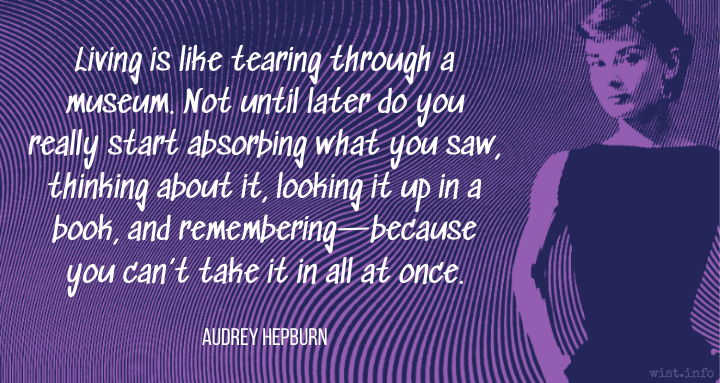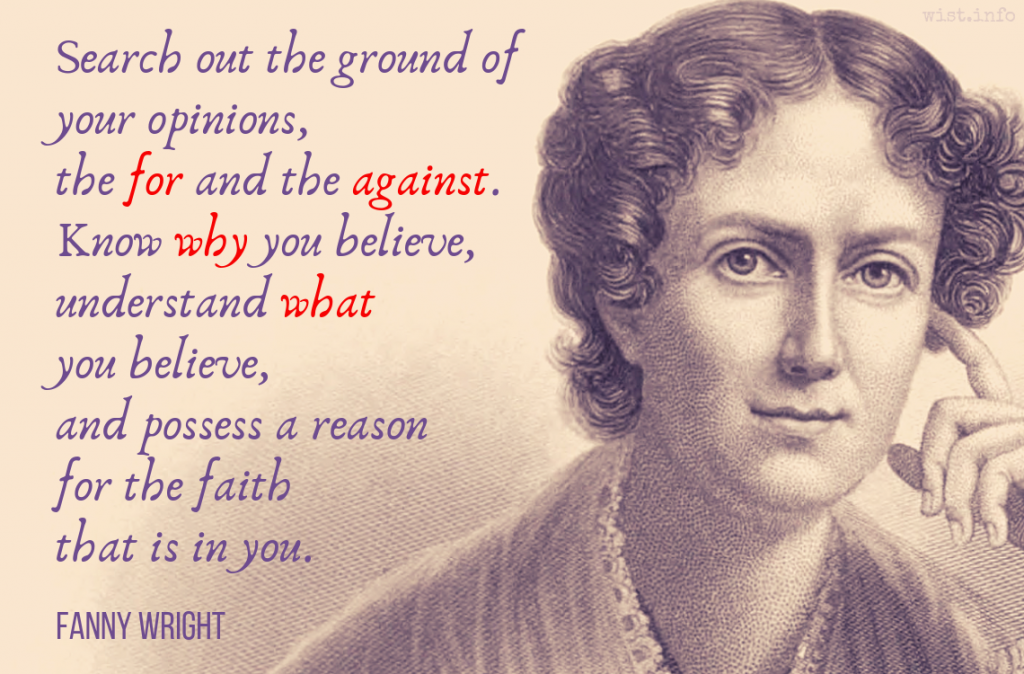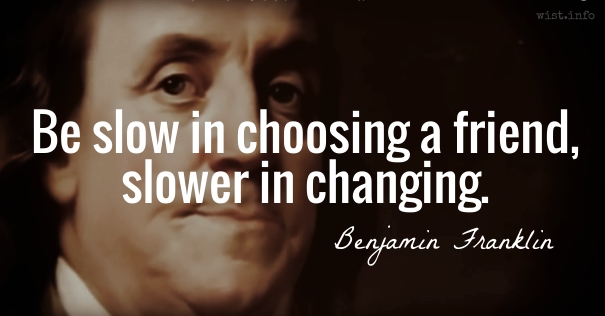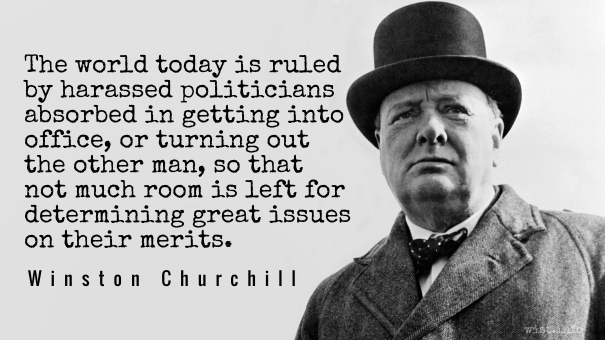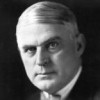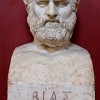There was a moment’s silence while everybody thought.
“I’ve got a sort of idea,” said Pooh at last, “but I don’t suppose it’s a very good one.”
“I don’t suppose it is either,” said Eeyore.A. A. Milne (1882-1956) English poet and playwright [Alan Alexander Milne]
House at Pooh Corner, ch. 6 “Eeyore Joins the Game” (1928)
(Source)
Quotations about:
consideration
Note not all quotations have been tagged, so Search may find additional quotes on this topic.
ORSINA: Better counsel comes overnight.
[Besserer Rat kommt über Nacht.]Gotthold Lessing (1729-1781) German playwright, philosopher, dramaturg, writer
Emilia Galotti, Act 4, sc. 3 (1772)
It is unclear if this is a traditional German saying, or was coined by Lessing. There are parallels in other languages (as well as German), but I did not find a German reference in these words that predates this play.
(Source (German))
Better counsel comes with the night.
[Source (1842)]
Morning brings better counsel.
[tr. Lewes/Taylor (1890)]
Better counsel often comes by night.
[tr. Gode-von Aesch (1959?)]
SanDeE*: I don’t put any pressure on you, do I?
HARRIS: Not at all … I don’t pressure you, do I?
SanDeE*: No, no, I just don’t think there should be any pressure.
HARRIS: No. Tell me if I pressure you.
SanDeE*: OK. And you too, but don’t feel like you have to.
Steve Martin (b. 1945) American comedian, actor, writer, producer, musician
L. A. Story (1991)
(Source)
To show lack of consideration for those who in any capacity serve us — whether in restaurants, hotels, or stores, or in public places anywhere — is always an evidence of ill-breeding as well as inexcusable selfishness. It is only those who are afraid that someone may encroach upon their exceedingly insecure dignity who show neither courtesy nor consideration except to those whom they think it would be to their advantage to please.
Emily Post (1872-1960) American author, columnist [née Price]
Etiquette: The Blue Book of Social Usage, ch. 8 “Entertaining at a Restaurant” (1922; 1955 10th ed.)
(Source)
See also Paul Eldridge.
It is all right to say exactly what you think if you have learned to think exactly.
Marcelene Cox (1900-1998) American writer, columnist, aphorist
“Ask Any Woman” column, Ladies’ Home Journal (1945-11)
(Source)
Cox provided a variant of this aphorism in the 1959-01 issue of LHJ: "Anyone has the right to say what he thinks, if he thinks."
But justice commands us to have mercy upon all men, to consult the interests of the whole human race, to give to every one his due, and injure no sacred, public, or foreign rights, and to forbear touching what does not belong to us.
[Iustitia autem praecipit parcere omnibus, consulere generi hominum, suum cuique reddere, sacra, publica, aliena non tangere.]
Marcus Tullius Cicero (106-43 BC) Roman orator, statesman, philosopher
De Re Publica [On the Republic, On the Commonwealth], Book 3, ch. 15 / sec. 24 (3.24) [Philus] (54-51 BC) [tr. Yonge (1853), ch. 12]
(Source)
Contrasting the dictates of justice, vs the wisdom/prudence of conquest. Earlier sources arrange the fragments to make this ch. 12, as noted. (Source (Latin)). Alternate translations:
But justice orders us to spare all, to consult the welfare of mankind, to give to every one his own, and to abstain from every thing that is sacred, every thing that is public, every thing which is not our own.
[tr. Featherstonhaugh (1829), ch. 12]
But justice commands us to have mercy upon all men, to consult the interests of the whole human race, to give to every one his due, and injure no sacred, public, or foreign rights, and to forbear touching what does not belong to us.
[tr. Barham (1841), ch. 12]
Justice, on the other hand, instructs us to spare all men, to consider the interests of the whole human race, to give everyone his due, and not to touch the sacred or public property, or that which belongs to others.
[tr. Keyes (1928)]
Justice, on the other hand, teaches you to spare all men, to consider the interests of the human race, to render to each his own, and not to tamper with that which is sacred, that which is public, and that which belongs to another. [tr. Sabine/Smith (1929)]
Justice, on the other hand, teaches us to spare all men, take thought for the interests of mankind, give everyone his due, and not lay hands on the things belonging to the gods, the state, or somebody else.
[tr. Rudd (1998)]
Justice instructs us to spare everyone, to look after the interests of the human race, to render to each his own, to keep hands off things that are sacred or public or belong to someone else.
[tr. Zetzel (1999), ch. 24b]
But justice instructs [us] to spare everyone, to take care of the human race, to render to each his own, not to touch sacred things, public things, another's things.
[tr. Fott (2014)]
It is this right, the right to err politically, which keeps us strong as a Nation. For no number of laws against communism can have as much effect as the personal conviction which comes from having heard its arguments and rejected them, or from having once accepted its tenets and later recognized their worthlessness.
Hugo Black (1886-1971) American politician and jurist, US Supreme Court Justice (1937-71)
Barenblatt v. United States, 360 U.S. 109, 144 (1959) [dissent]
(Source)
You ought to regulate your manner of behaviour towards others, not according to your own humour, but agreeably to the pleasure and inclination of those with whom you converse.
[Il che acciò che tu più agevolmente apprenda di fare, dèi sapere che a te convien temperare et ordinare i tuoi modi non secondo il tuo arbitrio, ma secondo il piacer di coloro co’ quali tu usi, et a quello indirizzargli.]
Giovanni della Casa (1503-1556) Florentine poet, author, diplomat, bishop
Galateo: Or, A Treatise on Politeness and Delicacy of Manners [Il Galateo overo de’ costumi], ch. 2 (1558) [tr. Graves (1774)]
(Source)
(Source (Italian)). Alternate translations:
It behooves thee, to frame and order thy maners and doings, not according to thine owne minde and fashion: but to please those, with whome thou livest, and after that sort direct thy doings.
[tr. Peterson (1576)]
You must know that it will be to your advantage to temper and adapt your manners not according to your own choices but according to the pleasure of those with whom you are dealing and act accordingly.
[tr. Einsenbichler/Bartlett (1986)]
If a man takes no thought about what is distant, he will find sorrow near at hand.
[人無遠慮、必有近憂。]
Confucius (c. 551- c. 479 BC) Chinese philosopher, sage, politician [孔夫子 (Kǒng Fūzǐ, K'ung Fu-tzu, K'ung Fu Tse), 孔子 (Kǒngzǐ, Chungni), 孔丘 (Kǒng Qiū, K'ung Ch'iu)]
The Analects [論語, 论语, Lúnyǔ], Book 15, verse 12 (15.12) (6th C. BC – 3rd C. AD) [tr. Legge (1861), 15.11]
(Source)
In modern arrangements, this is 15.12; older ones use Legge's verse numberings (15.11). (Source (Chinese)). Alternate translations:
They who care not for the morrow will the sooner have their sorrow.
[tr. Jennings (1895), 15.11]
If a man takes no thought for the morrow, he will be sorry before today is out.
[tr. Ku Hung-Ming (1898), 15.11]
Who heeds not the future will find sorrow at hand.
[tr. Soothill (1910), 15.11]
Men who don't think of the far, will have trouble near.
[tr. Pound (1933), 15.11]
He who will not worry about what is far off will soon find something worse than worry close at hand.
[tr. Waley (1938), 15.11]
If a man does not give thought to problems which are still distant, he will be worried by them when they get nearer
[tr. Ware (1950), 15.12]
He who gives no thought to difficulties in the future is sure to be best by worries much closer at hand.
[tr. Lau (1979), 15.12]
If a man avoids thinking about distant matters he will certainly have worries close at hand.
[tr. Dawson (1993), 15.12]
A man with no concern for the future is bound to worry about the present.
[tr. Leys (1997), 15.12]
If a man does not have long-range considerations, he will surely incur imminent afflictions.
[tr. Huang (1997), 15.12]
If one has no any consideration for the future, might have some anxiety in near.
[tr. Cai/Yu (1998), 15.12]
The person who does not consider what is still far off will not escape being alarmed at what is near at hand.
[tr. Ames/Rosemont (1998), 15.12]
If a man has no worries about what is far off, he will assuredly have troubles that are near at hand.
[tr. Brooks/Brooks (1998), 15.12]
If things far away don't concern you, you'll soon mourn things close at hand.
[tr. Hinton (1998), 15.12]
The person who fails to take far-reaching precautions is sure to encounter near-at-hand woes.
[tr. Watson (2007) 15.12]
The person who does not think ahead about the distant future is sure to be troubled by worries close at hand.
[tr. Annping Chin (2014)]
If a person does not plan and prepare for the future, he must be beset by worries and troubles very soon.
[tr. Li (2020), 15.12]
Truth gains more even by the errors of one who, with due study and preparation, thinks for himself, than by the true opinions of those who only hold them because they do not suffer themselves to think.
John Stuart Mill (1806-1873) English philosopher and economist
On Liberty, ch. 2 “Of the Liberty of Thought and Discussion” (1859)
(Source)
When men are brought face to face with their opponents, forced to listen and learn and mend their ideas, they cease to be children and savages and begin to live like civilized men. Then only is freedom a reality, when men may voice their opinions because they must examine their opinions.
Walter Lippmann (1889-1974) American journalist and author
“The Indispensable Opposition,” The Atlantic Monthly (Aug 1939)
(Source)
The hardest lesson — and this is what child-rearing and perhaps all of manners is about — is that there are other people in the world and you do have to take their feelings into consideration. It doesn’t mean you always have to yield to them, but it does mean that you have to know how to deal with them. A lot of people know that they want to be treated politely, but they don’t make that little leap and say, Well, the other person must feel that way, too.
Judith Martin (b. 1938) American author, journalist, etiquette expert [a.k.a. Miss Manners]
In “Polite Company,” interview by Hara Estroff Marano, Psychology Today (1998-03)
(Source)
Such closet politicians never fail to assign the deepest motives for the most trifling actions; instead of often ascribing the greatest actions to the most trifling causes, in which they would be much seldomer mistaken. They read and write of kings, heroes, and statesmen, as never doing any thing but upon the deepest principles of sound policy. But those who see and observe kings, heroes and statesmen, discover that they have headaches, indigestions, humours, and passions, just like other people; every one of which, in their turns, determine their wills, in defiance of their reason.
Lord Chesterfield (1694-1773) English statesman, wit [Philip Dormer Stanhope]
Letter to his son, #205 (5 Dec 1749)
(Source)
Clichés, stock phrases, adherence to conventional, standardized codes of expression and conduct have the socially recognized function of protecting us against reality, that is, against the claim on our thinking attention that all events and facts make by virtue of their existence.
Hannah Arendt (1906-1975) German-American philosopher, political theorist
“Thinking and Moral Considerations: A Lecture,” Social Research (Fall 1971)
(Source)
Referring to Adolf Eichmann's use of "cliché-ridden language" as a sign of his "thoughtlessness." Reprinted in The Life of the Mind, Part 1 "Thinking," Introduction (1974).
A woman should never take a lover without the consent of her heart; nor a husband without the concurrence of her reason.
Anne "Ninon" de l'Enclos (1620-1705) French author, courtesan, patron of the arts [Ninon de Lenclos, Ninon de Lanclos]
The Memoirs of Ninon de L’Enclos, Vol. 1, “Life and Character” (1761)
(Source)
No matter what the belief, if it had modestly said, “This is our best thought, go on, think farther!” then we could have smoothly outgrown our early errors and long since have developed a religion such as would have kept pace with an advancing world. But we were made to believe and not allowed to think. We were told to obey, rather than to experiment and investigate.
Politics is, among other things, the art of anticipating consequences, and even trying to anticipate unfamiliar consequences.
Irving Howe (1920-1993) American literary and social critic [b. Irving Horenstein]
“The Agony of the Campus,” Dissent #16 (Sep-Oct 1969)
(Source)
I believe in aristocracy, though — if that is the right word, and if a democrat may use it. Not an aristocracy of power, based upon rank and influence, but an aristocracy of the sensitive, the considerate and the plucky. Its members are to be found in all nations and classes, and all through the ages, and there is a secret understanding between them when they meet. They represent the true human tradition, the one permanent victory of our queer race over cruelty and chaos. Thousands of them perish in obscurity, a few are great names. They are sensitive for others as well as for themselves, they are considerate without being fussy, their pluck is not swankiness but the power to endure, and they can take a joke.
Living is like tearing through a museum. Not until later do you really start absorbing what you saw, thinking about it, looking it up in a book, and remembering — because you can’t take it in all at once.
Audrey Hepburn (1929-1993) Belgian-English actress
Quoted in David Hofstede, Audrey Hepburn: A Bio-bibliography (1994)
(Source)
Anger blows out the lamp of the mind. In the examination of a great and important question, every one should be serene, slow-pulsed and calm.
Robert Green Ingersoll (1833-1899) American lawyer, agnostic, orator
“The Christian Religion,” Article 3, The North American Review (1881)
(Source)
I must intreat your patience — your gentle hearing. I am not going to question your opinions. I am not going to meddle with your belief. I am not going to dictate to you mine. All that I say is, examine; enquire. Look into the nature of things. Search out the ground of your opinions, the for and the against. Know why you believe, understand what you believe, and possess a reason for the faith that is in you.
Frances "Fanny" Wright (1795-1852) Scottish-American writer, lecturer, social reformer
A Course of Popular Lectures, Lecture 3 “Of the more Important Divisions and Essential Parts of Knowledge” (1829)
(Source)
Manners are a sensitive awareness of the feelings of others. If you have that awareness, you have good manners, no matter what fork you use.
Emily Post (1872-1960) American author, columnist [née Price]
(Attributed)
Often cited to her famous Etiquette in Society, in Business, in Politics, and at Home (1922), but not found in that work. Claimed as genuine by the Emily Post Institute.
You sit at the board and suddenly your heart leaps. Your hand trembles to pick up the piece and move it. But what chess teaches you is that you must sit there calmly and think about whether it’s really a good idea and whether there are other, better ideas.
The pretext for indecisiveness is commonly mature deliberation; but in reality indecisive men occupy themselves less in deliberation than others; for to him who fears to decide, deliberation (which has a foretaste of that fear) soon becomes intolerably irksome, and the mind escapes from the anxiety of it into alien themes.
Henry Taylor (1800-1886) English dramatist, poet, bureaucrat, man of letters
The Statesman: An Ironical Treatise on the Art of Succeeding, ch. 21 (1836)
(Source)
Thought is sad without action, and action is sad without thought.
Henri-Frédéric Amiel (1821-1881) Swiss philosopher, poet, critic
Journal (2nd Ed.,1889)
(Source)
Quoted in Cesare Lombroso, The Man of Genius (1896),
For to be civilized is to be incapable of giving unnecessary offense, it is to have some quality of consideration for all who cross our path.
Agnes Repplier (1855-1950) American writer
“A Question of Politeness,” Americans and Others (1912)
(Source)
I’m thinking on the fly, here. (Although now that I’m in middle management I think I’m supposed to call it “refactoring the strategic value proposition in real time with agile implementation,” or, if I’m being honest, “making it up as I go along.”)
“Why now,” said Tazendra. “There is an idea. What do you think of Kytraan’s idea, Piro?”
“It is one I had not thought of,” admitted Piro.
“And do you think it a good one?” said Kytraan.
“I must consider it.”
“Oh,” said Tazendra, “we have nothing against considering.”
“No, indeed,” said Kytraan. “I, myself, have been known to consider on occasion, and would scarcely begrudge another’s chance to consider.”
“That is good, then; I will do so.”
“And will you do so now?” said Tazendra.
“I am considering this very instant,” said Piro. .
“That is good,” said Kytraan.
“Yes. I could not tell, or I should not have asked,” said Tazendra.
“Then it is right that you asked.”
“Do you think so?”
“I am certain of it.”
“Well, then I am pleased.”
“And you should be. But, your pardon, I am considering.”
“Of course,” said Tazendra, falling silent.
When my information changes, I alter my conclusions. What do you do, sir?
John Maynard Keynes (1883-1946) English economist
(Attributed)
Reply to a criticism of having changed his position on monetary policy. Quoted in Paul Samuelson, "The Keynes Centenary" The Economist, Vol. 287 (1983), but possibly apocryphal (see here).
Variants:
- "When events change, I change my mind. What do you do?"
- "When the facts change, I change my mind. What do you do, sir?"
- "When someone persuades me that I am wrong, I change my mind. What do you do?"
Be slow in chusing a Friend, slower in changing.
Benjamin Franklin (1706-1790) American statesman, scientist, philosopher, aphorist
Poor Richard (1735 ed.)
(Source)
FALSTAFF: The better part of valour is discretion.
William Shakespeare (1564-1616) English dramatist and poet
Henry IV, Part 1, Act 4, sc. 4, l. 122ff (4.4.122) (1597)
(Source)
“Would you like me to arrest you?” I asked. That’s an old police trick: If you just warn people they often just ignore you, but if you ask them a question then they have to think about it. Once they start to think about the consequences they almost always calm down, unless they’re drunk of course, or stoned, or aged between fourteen and twenty-one, or Glaswegian.
The convictions that leaders have formed before reaching high office are the intellectual capital they will consume as long as they continue in office. There is little time for leaders to reflect. They are locked in an endless battle in which the urgent constantly gains on the important. The public life of every political figure is a continual struggle to rescue an element of choice from the pressure of circumstance.
For all but one in thousands the goal of their thinking is the point at which they have become tired of thinking.
[Tausenden für einen ist das Ziel ihres Nachdenkens die Stelle, wo sie des Nachdenkens müde geworden.]Gotthold Lessing (1729-1781) German playwright, philosopher, dramaturg, writer
Letter (1771-01-09), to Moses Mendelssohn
(Source)
(Source (German)). Alternate translations:
In a thousand cases to one, the goal of reflection is set at the point where one gets tired of reflection.
(Source)
For the vast majority of men, the object of their reflection lies at the point where they become tired of reflecting.
(Source)
But the truth is, that no man is much regarded by the rest of the world, except where the interest of others is involved in his fortune. The common employments or pleasures of life, love or opposition, loss or gain, keep almost every mind in perpetual agitation. If any man would consider how little he dwells upon the condition of others, he would learn how little the attention of others is attracted by himself.
Samuel Johnson (1709-1784) English writer, lexicographer, critic
The Rambler, #159 (24 Sep 1751)
(Source)
If everbuddy thought before they spoke ther wouldn’t be enough noise in this world t’ scare a jaybird.
[If everybody thought before they spoke there wouldn’t be enough noise in this world to scare a jaybird.]
Think before you speak. Read before you think. This will give you something to think about that you didn’t make up yourself — a wise move at any age, but most especially at seventeen, when you are in the greatest danger of coming to annoying conclusions.
Not that indeed I imitated the sceptics, who only doubt for the sake of doubting, and pretend to be always uncertain; for, on the contrary, my design was only to provide myself with good ground for assurance, and to reject the quicksand and mud in order to find the rock or clay.
[Non que j’imitasse pour cela les sceptiques, qui ne doutent que pour douter, et affectent d’être toujours irrésolus; car, au contraire, tout mon dessein ne tendoit qu’à m’assurer, et à rejeter la terre mouvante et le sable pour trouver le roc ou l’argile.]
René Descartes (1596-1650) French philosopher, mathematician
Discourse on Method [Discours de la méthode], Part 3 (1637) [tr. Haldane & Ross (1911)]
(Source)
(Source (French)). Alternate translations:
Not that I therein imitated the Scepticks, who doubt onely to the end they may doubt, and affect to be always unresolved: For on the contrary, all my designe tended onely to fix my self, and to avoid quick-mires and sands, that I might finde rock and clay.
[tr. Newcombe ed. (1649)]
Not that in this I imitated the sceptics who doubt only that they may doubt, and seek nothing beyond uncertainty itself; for, on the contrary, my design was singly to find ground of assurance, and cast aside the loose earth and sand, that I might reach the rock or the clay.
[tr. Veitch (1901)]
For all that, I did not imitate the sceptics who doubt only for doubting's sake, and pretend to be always undecided; on the contrary, my whole intention was to arrive at a certainty, and to dig away the drift and the sand until I reached the rock or the clay beneath.
[tr. Huxley (1870)]
In doing this I was not copying the sceptics, who doubt only for the sake of doubting and pretend to be always undecided; on the contrary, my whole aim was to reach certainty -- to cast aside the loose earth and sand so as to come upon rock or clay.
[tr. Cottingham, Stoothoff (1985)]
All you learn and all you can read will be of little use to you if you do not think and reason upon it yourself. One reads to know other people’s thoughts, but if we take them upon trust, without examining and comparing them with our own, it is really living upon other people’s scraps or retailing other people’s goods. To know the thoughts of others, is of use, because it suggests thoughts to one’s self, and helps one to form a judgment; but to repeat other people’s thoughts, without considering whether they are right or wrong, is the talent only of a parrot, or at most a player.
Lord Chesterfield (1694-1773) English statesman, wit [Philip Dormer Stanhope]
Letter to his son, #67, “Thursday” (1740-41)
(Source)
Choose the course which you adopt with deliberation; but when you have adopted it, then persevere in it with firmness.
Life does not consist mainly — or even largely — of facts and happenings. It consists mainly of the storm of thoughts that is forever blowing through one’s head.
Mark Twain (1835-1910) American writer [pseud. of Samuel Clemens]
Autobiography, Part 1, sec. 28 “New York, January 10, 1906” (2003)
Full text.
In whatsoever Condition thou art, still ask thyself, What would my blessed Savior have thought, said, and done in this Case.
Thomas Fuller (1654-1734) English physician, preacher, aphorist, writer
Introductio ad Prudentiam, # 693 (1725)
(Source)
"What Would Jesus Do?"
Some books are to be tasted, others to be swallowed, and some few to be chewed and digested: that is, some books are to be read only in parts; others to be read, but not curiously; and some few to be read wholly, and with diligence and attention.
Francis Bacon (1561-1626) English philosopher, scientist, author, statesman
“Of Studies,” Essays, No. 50 (1625)
(Source)
If we are asked what is the most essential characteristic that underlies this word, the word itself will guide us to gentleness, to absence of such things as brow-beating, overbearing manners and fuss, and generally to consideration for other people.
Samuel Butler (1835-1902) English novelist, satirist, scholar
The Note-Books of Samuel Butler, “Gentleman” (1912)
(Source)
Once for all, then, a short precept is given thee: Love, and do what thou wilt: whether thou hold thy peace, through love hold thy peace; whether thou cry out, through love cry out; whether thou correct, through love correct; whether thou spare, through love do thou spare: let the root of love be within, of this root can nothing spring but what is good.
Augustine of Hippo (354-430) Christian church father, philosopher, saint [b. Aurelius Augustinus]
Homilies on the 1st Epistle of John Tractatus in epistulam Ioannis ad Parthos], Homily 7 [tr. Browne (1888)]
(Source)
Sermon on 1 John 4:4-12. "Love, and do what thou wilt" - Latin dilige et quod vis fac. Sometimes incorrectly given as "ama et fac quod vis." Alternate translation: "Love and then what you will, do." [tr. Fletcher]
To let a sudden fit of anger make you forget the dangers you risk for yourself and for those who are nearest and dearest to you — is this not clouded judgment?
[A. 一朝之忿、忘其身以及其親、非惑與。]
[B. 一朝之忿忘其身以及其亲非惑与]
Confucius (c. 551- c. 479 BC) Chinese philosopher, sage, politician [孔夫子 (Kǒng Fūzǐ, K'ung Fu-tzu, K'ung Fu Tse), 孔子 (Kǒngzǐ, Chungni), 孔丘 (Kǒng Qiū, K'ung Ch'iu)]
The Analects [論語, 论语, Lúnyǔ], Book 12, verse 21 (12.21) (6th C. BC – AD 3rd C.) [tr. Chin (2014)]
(Source)
Waley suggests the internal rhymes in both the questions in 12.21 and this particular answer mean they are quotations from an outside source, a "didactic poem," and thus carry additional meaning now lost.
(Source (Chinese) A, B). Alternate translations:
For a morning's anger to disregard one's own life, and involve that of his parents; -- is not this a case of delusion?
[tr. Legge (1861)]
And as to illusions, is not one morning's fit of anger, causing a man to forget himself, and even involving the consequences those who are near and dear to him -- is not that an illusion?
[tr. Jennings (1895)]
If a man allows himself to lose his temper and forget himself of a morning, in such a way as to become careless for the safety of is own person and for the safety of his parents and friends: -- is that not a case of a great delusion in life?
[tr. Ku Hung-Ming (1898)]
For a morning's anger to forget his own safety and involve that of his relatives, is not this irrational?
[tr. Soothill (1910)]
For one morning’s temper to jeopard one's life and even that of one's relatives, isn’t that hallucination?
[tr. Pound (1933)]
Because of a morning's blind rage to forget one's own safety and even endanger one's kith and kin, is that not a case of divided mind?
[tr. Waley (1938)]
In a moment’s burst of anger to forget oneself and one’s family. Wouldn’t this be utter confusion?
[tr. Ware (1950)]
To let a sudden fit of anger make you forget the safety of your own person or even that of your parents, is that not misguided judgment?
[tr. Lau (1979)]
To be oblivious of one's own person and even of one's own parents all because of a morning's anger -- is this not a confusion?
[tr. Dawson (1993)]
To endanger oneself and one's kin in a sudden fit of anger: is this not an instance of incoherence?
[tr. Leys (1997)]
In a fit of rage, you forget yourself and even your parents -- is that not delusion?
[tr. Huang (1997)]
If one has any anger so that one forgets one's pro0per behavior to take the anger upon the relatives, is not one confused?
[tr. Cai/Yu (1998), #307]
In a moment of rage to forget not only one's own person but even one's parents -- is this not being in a quandary?
[tr. Ames/Rosemont (1998)]
For the anger of a morning, to forget one's self and even one's kin, is that not a contradiction?
[tr. Brooks/Brooks (1998)]
To endanger yourself and your family, all in a morning's blind rage -- is that not delusion?
[tr. Hinton (1998)]
To forget yourself in a moment of anger and thereby bring ruin upon both you and your family -- is this not an example of confusion?
[tr. Slingerland (2003)]
Because of one morning's anger, to forget your own safety and even endanger those close to you -- this is faulty thinking, isn't it?
[tr. Watson (2007)]
If you act out of animus with the consequence of hurting yourelf and yoru loved ones, is that an example of delusion?
[tr. Li (2020)]
A common paraphrase of this is "When anger rises, think of the consequences." This is attributed to Confucius in Kang-Hi (K'ang-hsi, Kangxi) The Sacred Edict, Maxim #16 (1670, 1724) [tr. Milne (1817)]. An alternate translation is "In anger, think of the trouble" [tr. Baller (1892), ch. 16, sec. 15]
Act nothing in furious Passion; it’s putting to Sea in a Storm.
Thomas Fuller (1654-1734) English physician, preacher, aphorist, writer
Introductio ad Prudentiam, Vol. 1, # 365 (1725)
(Source)
You probably wouldn’t worry about what people think of you if you could know how seldom they do.
Olin Miller (fl. early 20th C) American humorist
(Attributed)
First quoted by Walter Winchell, "On Broadway" (7 Jan 1937)
Also frequently attributed to Mark Twain, Eleanor Roosevelt, and Ethel Barrett; the latter used it ("We would worry less about what others think of us, if we realized how seldom they do") in her 1968 book Don’t Look Now But Your Personality is Showing. See here for more information.
Variants:
- "You’ll worry less about what people think about you when you realize how seldom they do."
- "You wouldn’t worry about what people may think of you if you could know how seldom they do."
- "We wouldn’t worry so much about what folks think of us if we knew how seldom they do."
- "You wouldn’t worry so much about what people think of you, if you knew how seldom they do."
- "You wouldn’t worry so much about what other people think if you realized how seldom they do."
See also Johnson.
It is the mark of an educated mind to be able to entertain a thought without accepting it.
Aristotle (384-322 BC) Greek philosopher
(Spurious)
First attributed to Aristotle in Lowell L. Bennion, Religion and the Pursuit of Truth (1959). Unfound as such.
Sometimes thought (though I feel it's a bit of a stretch) a misinterpretation of Nicomachean Ethics 1.3.4 (1094b): "For it is the mark of an educated person to search for the same kind of clarity in each topic to the extent that the nature of the matter accepts it."
More discussion of this quotation:
The pillow is a silent Sibyl, and to sleep upon an enterprise avails more than to be sleepless under it.
[Es la almohada Sibila muda, y el dormir sobre los puntos vale más que el desvelarse debajo de ellos.]
Baltasar Gracián y Morales (1601-1658) Spanish Jesuit priest, writer, philosopher
The Art of Worldly Wisdom [Oráculo Manual y Arte de Prudencia], § 151 (1647) [tr. Fischer (1937)]
(Source)
(Source (Spanish)). Alternate translations:
The Pillow is a dumb Sibylle. To sleep upon a thing that is to be done, is better than to be awaked by a thing already done.
[Flesher ed. (1685)]
The pillow is a silent Sibyl, and it is better to sleep on things beforehand than lie awake about them afterwards.
[tr. Jacobs (1892)]
The pillow is a tongueless sibyl, and it is better to sleep on something than to lie awake when things are on top of you.
[tr. Maurer (1992)]





















